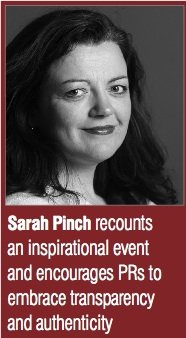
ETHICS AND BEST PRACTICE IN PR
“We cannot celebrate our own successes without acknowledging our failures”
 Over the last few weeks, as president of the Chartered Institute of Public Relations, I have under our code of conduct called out two areas of poor practice. It is yet to be seen if any CIPR members have been involved, or indeed if the actions were taken by PR professionals, but it cannot be argued that the leaflet produced the Department of Work and Pensions which fabricated favourable case study quotes and the ‘recommendations’ given by a PR agency and its staff to a planning application, do our profession any favours.
Over the last few weeks, as president of the Chartered Institute of Public Relations, I have under our code of conduct called out two areas of poor practice. It is yet to be seen if any CIPR members have been involved, or indeed if the actions were taken by PR professionals, but it cannot be argued that the leaflet produced the Department of Work and Pensions which fabricated favourable case study quotes and the ‘recommendations’ given by a PR agency and its staff to a planning application, do our profession any favours.
At the crux of both of these cases is ethical competence. But what does ethical competence mean? It is a professional’s ability to apply technical knowledge and strategic capability in a manner which is consistent with a relevant code of practice. For public relations, the CIPR Code of Conduct aims to provide practitioners with ethical guidance, setting out a list of principles that guide PR professionals in determining the ‘right’ course of action. It’s clear that in recent cases – considerations of the ‘right’ course of action simply haven’t been applied.
In every profession, trade or practice, there are those who flout the rules. We all know accountants, engineers, gas fitters and others who have been struck off – or with whom we would not chose to work again.
The most important things for me are twofold. First, we cannot celebrate our own successes without acknowledging our failures, the two have to work side-by-side, and only together, I believe, will we raise standards and improve our reputation. Second, we have a responsibility to the public to ensure that the highest standards are being met.
Recently I helped organise an event in the Cotswolds, bringing together journalists and PRs to talk about the challenges of getting gritty, social issues commissioned by the media – and how we can learn from organisations willing to give access and information on challenging subjects and situations.
Stephen Wildblood QC, spoke about his extensive experience as a family court judge about their inability to undertake their own analysis and evaluation; that internal validation does not, in his opinion, work, ever. It is only by being scrutinised by others that real analysis, clear transparency and meaningful challenge can be given. Wildblood is leading the Transparency Project, which seeks to enable the family courts to be more open with the media. Journalists, he says, “Are the eyes and ears of society.” Groundbreaking judges, like Wildblood are asking for the help of PR professionals and journalists to enable highly sensitive, difficult, information to be treating with respect – but most importantly be open to external scrutiny; something every PR should be willing to help with.
Continuing the theme of openness, Helen Lewis from the New Statesman spoke about how editors long to commission pieces with gritty content – but made a plea for those articles to be interesting, to have an ordinariness about them and, most importantly, details, access and content. Lewis made, I believe, a clear request from public relations professionals working across organisations to help journalists – and, in turn, help editors commission more gritty stories – get the content sorted, the case studies, the photos, the access. Let us shine a light of transparency on what our organisations do, and be open to engage in constructive debate about both the good and bad of what they deliver. We have nothing to fear. It’s the least we owe to the people we represent.
Sarah Pinch is president of the CIPR



